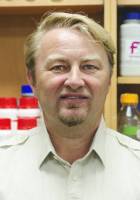The CAFNR Ag-celerator for Agricultural Technologies (CAAT) is a new translational research funding opportunity for faculty in the College of Agriculture, Food and Natural Resources (CAFNR). The CAFNR Strategic Plan established an ambitious goal to double intellectual property metrics such as invention disclosures, patents and start-up companies based on translational research done in the college. CAAT is designed to accelerate the translation of agriculture, food and natural resources innovations into products and processes that improve the lives of people in Missouri and beyond. This program bridges the gap between academic research and industry, providing funding to CAFNR faculty to bring their inventions to the marketplace. Two CAFNR faculty have been awarded the inaugural grant.
“We hope this funding helps take these outstanding researchers to the next level in terms of getting their technology to commercialization,” said Shibu Jose, associate dean of research in CAFNR. “We’re thrilled to be able to offer this funding for projects like Peter (Sutovsky’s) and Jianfeng (Zhou’s), and we invite all CAFNR researchers to consider what innovations they might be able to bring to the market. It’s an exciting new era in university research, and we’re thrilled to be part of it here in our college.”
An oversight committee consisting of representatives from the MU Office of Technology Advancement, CAFNR, industry and the investment community selected the awardees based on two rounds of competition, including a pitch talk.

Jianfeng Zhou (pictured left), assistant professor in plant science and technology, was awarded $15,000 for his project, Smart sow estrus detection system using artificial intelligence (AI) camera system. Project collaborators include Tim Safranski, professor of animal sciences and state swine extension specialist; Teng Teeh Lim, extension professor, plant science and technology; and Prasad Calyam, associate professor and Greg L. Gilliom Professor of Cyber Security, College of Engineering.
Zhou said that he and his team will use the grant for future tests and validate their artificial intelligence (AI)-enabled robotic sow estrus detection system in research and commercial sow farms. They are using the funding to build a second-generation prototype that has more advanced AI algorithms and an improved robotic platform to operate in swine farms.
“This award will allow us to collect more data at a commercial setup and fine-tune the technology to get it out to sow farmers,” said Zhou. “We expect partnership with major pork-producing companies to fully commercialize the product.”
This project has a lot of impact on Missourians and beyond, he said, as labor issues are hurting the agriculture market in Missouri and globally. Sow farmers are facing challenges in hiring sufficient skilled workers.
“Emerging technologies, including advanced sensors, robotics and AI, are transforming traditional agriculture to smart agriculture that is more efficient,” said Zhou. “The success of this project is expected to reduce the labor needed in sow estrus detection by 50 percent by providing a robotic system. We also expect the data-driven decisions to optimize management, improve sow reproduction and increase profit for sow farmers.”
The innovation has already been selected by the MU Technology Advancement Office as a potential innovation to commercialize. A provisional patent has been filed.
“Receiving this funding means a lot to our research program,” said Zhou. “It allows us to continue to improve our innovation. Without the funding, we can hardly scale up our experiments and validate the innovation in a large farm setup.
“Secondly, seed funding allows us to acquire more data to apply for large funding from external agencies. In addition, this funding gives us more confidence and encouragement by CAFNR to work on such translational research projects.”
 Peter Sutovsky (pictured right), professor in the Division of Animal Sciences, was awarded $49,945 for his project, Proprietary Compositions and Additives for Boar Semen Preservation. Project collaborators include Michal Zigo, research scientist in animal sciences, and Karl Kerns, assistant professor at Iowa State University and adjunct assistant professor in animal sciences.
Peter Sutovsky (pictured right), professor in the Division of Animal Sciences, was awarded $49,945 for his project, Proprietary Compositions and Additives for Boar Semen Preservation. Project collaborators include Michal Zigo, research scientist in animal sciences, and Karl Kerns, assistant professor at Iowa State University and adjunct assistant professor in animal sciences.
Sutovsky said that he and his team will use this award to test specific sperm cell-protecting additives to boar semen extenders used to prepare sperm doses for artificial insemination. Artificial insemination is the dominant reproductive management in swine as well as dairy cattle. This technology will help increase profitability and reduce the environmental footprint of swine operations in Missouri and beyond.
“Better semen extenders with more viable sperm cells yield better pregnancy rates and larger litter sizes,” Sutovsky said. “It also requires fewer laborious re-inseminations to be done at production farms and fewer adult boars to be kept in boar studs.”
Currently, there are 60,000 pork producers in the United States supporting 550,000 jobs and marketing 15 million hogs per year, Sutovsky said. Higher fertility in hogs can achieve just one extra piglet per litter, which could bring an estimated $135 million annually to producers.
“We are very grateful for this award, and we appreciate the support we have been receiving from CAFNR,” Sutovsky said. “The CAAT initiative is a very worthy undertaking that will no doubt reinvigorate our faculty and associated researchers working on potentially marketable research.”
“We have outstanding researchers conducting basic, applied and translational research in our college,” Jose said. “CAAT will offer another helping hand in translating their research into technologies that benefit society.”
CAAT is an annual competition. More information about the CAAT grant funding can be found on the CAFNR Office of Research page.